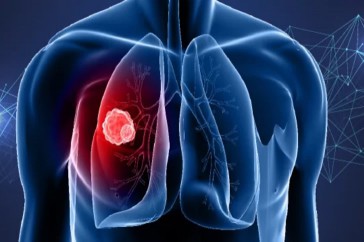Lung cancer, one of the foremost causes of death globally, often goes undetected in its early stages. Timely identification of its signs can lead to early intervention, increasing chances of successful treatment. Let’s delve into some of these preliminary indicators.

Persistent cough: It’s not uncommon to have a cough when battling a cold or flu. However, a cough that lingers for weeks, or even worsens, might be indicative of something more severe, such as lung cancer. While a persistent cough could also be symptomatic of other illnesses, such as bronchitis or pneumonia, it’s essential not to dismiss it and consult with a healthcare professional.
Chest pain: A consistent pain in the chest, shoulders, or back could be alarming. If you experience discomfort from activities as simple as breathing, laughing, or coughing, it might be a symptom worth investigating. While this pain could be a result of multiple factors or other ailments, when persistent, it’s crucial to seek medical advice to rule out lung cancer.
Shortness of breath: Suddenly finding it hard to catch your breath after climbing a flight of stairs when you used to do so easily? This could be a warning sign. Shortness of breath in lung cancer patients might occur due to a blockage caused by a tumor or because of fluid accumulation in the chest, hindering efficient lung function.
Voice changes: A subtle change, like your voice becoming hoarser or deeper, can be easy to dismiss. However, if these changes persist for more than two weeks, or if you find your voice tiring out easily, it could be an early sign of lung cancer affecting your laryngeal nerves.
Recurring infections: While infections like bronchitis and pneumonia are common, having them recur frequently or not healing as they should might be a concern. It could indicate an underlying issue such as a tumor obstructing the airway, making one prone to infections.
No symptom should be dismissed as trivial, especially when persistent. Always trust your body’s signals. It’s essential to consult a healthcare professional if any of these signs manifest. Early detection and diagnosis can significantly influence the prognosis of lung cancer.
